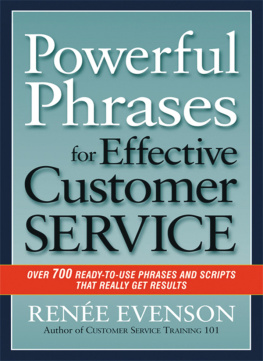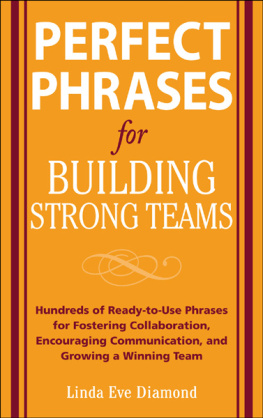Perfect Phrases for Business Letters
Perfect Phrases for Business Letters
Hundreds of Ready-to-Use Phrases
for Writing Effective Business Letters,
Memos, E-Mail, and More
Ken OQuinn

Copyright 2006 by Ken OQuinn. All rights reserved. Except as permitted under the United States Copyright Act of 1976, no part of this publication may be reproduced or distributed in any form or by any means, or stored in a database or retrieval system, without the prior written permission of the publisher. ISBN: 978-0-07-163090-0 MHID: 0-07-163090-2 The material in this eBook also appears in the print version of this title: ISBN: 978-0-07-145976-1, MHID: 0-07-145976-6. All trademarks are trademarks of their respective owners. Rather than put a trademark symbol after every occurrence of a trademarked name, we use names in an editorial fashion only, and to the benefit of the trademark owner, with no intention of infringement of the trademark.
Where such designations appear in this book, they have been printed with initial caps. McGraw-Hill eBooks are available at special quantity discounts to use as premiums and sales promotions, or for use in corporate training programs. To contact a representative please e-mail us at bulksales@mcgraw-hill.com. TERMS OF USE This is a copyrighted work and The McGraw-Hill Companies, Inc. (McGraw-Hill) and its licensors reserve all rights in and to the work. Use of this work is subject to these terms.
Except as permitted under the Copyright Act of 1976 and the right to store and retrieve one copy of the work, you may not decompile, disassemble, reverse engineer, reproduce, modify, create derivative works based upon, transmit, distribute, disseminate, sell, publish or sublicense the work or any part of it without McGraw-Hills prior consent. You may use the work for your own noncommercial and personal use; any other use of the work is strictly prohibited. Your right to use the work may be terminated if you fail to comply with these terms. THE WORK IS PROVIDED AS IS. McGRAW-HILL AND ITS LICENSORS MAKE NO GUARANTEES OR WARRANTIES AS TO THE ACCURACY, ADEQUACY OR COMPLETENESS OF OR RESULTS TO BE OBTAINED FROM USING THE WORK, INCLUDING ANY INFORMATION THAT CAN BE ACCESSED THROUGH THE WORK VIA HYPERLINK OR OTHERWISE, AND EXPRESSLY DISCLAIM ANY WARRANTY, EXPRESS OR IMPLIED, INCLUDING BUT NOT LIMITED TO IMPLIED WARRANTIES OF MERCHANTABILITY OR FITNESS FOR A PARTICULAR PURPOSE. McGraw-Hill and its licensors do not warrant or guarantee that the functions contained in the work will meet your requirements or that its operation will be uninterrupted or error free.
Neither McGraw-Hill nor its licensors shall be liable to you or anyone else for any inaccuracy, error or omission, regardless of cause, in the work or for any damages resulting there from. McGraw-Hill has no responsibility for the content of any information accessed through the work. Under no circumstances shall McGraw-Hill and/or its licensors be liable for any indirect, incidental, special, punitive, consequential or similar damages that result from the use of or inability to use the work, even if any of them has been advised of the possibility of such damages. This limitation of liability shall apply to any claim or cause whatsoever whether such claim or cause arises in contract, tort or otherwise. To Lori Ben, Hillary, Jaime, and Pat
Acknowledgments
Numerous people played a role, directly or indirectly, in the writing of this book, and I appreciate their support.
Table of Contents
Part One
Getting Started Writing
Business Letters
Chapter 1
Organizing Your Message
Perhaps you find that the most difficult first step in writing is not giving birth to the first sentence but garnering the necessary discipline to sit down and commit yourself to the blank screen.
Table of Contents
Part One
Getting Started Writing
Business Letters
Chapter 1
Organizing Your Message
Perhaps you find that the most difficult first step in writing is not giving birth to the first sentence but garnering the necessary discipline to sit down and commit yourself to the blank screen.
You avoid as long as you can:You think of other things you need to do and pretend that they are more important, you go get another cup of coffee, you stick your head in a friends office and chat, or you clean your desk and promise to get to the writing task tomorrow. This powerful force that seeks to distract us from writing and to kill our creativity and spirit is called resistance. It is a more difficult habit to break than drugs or liquor, says author Stephen Pressfield. Resistance is the enemy within. Recognizing resistance for what it is will enable you to ask why it is occurring. Are you worried about the readers response? Is your managers critical editing voice resonating in your mind? Is something unrelated to the writing task weighing on your mind? Perhaps you lack confidence, which sometimes is self-inflicted.
Writers, like athletes, often hamper their performance with what is called negative self-talk. An athlete leaves the field mumbling, I cant afford to make such stupid mistakes. Similarly when you say, I cant write, it is self-defeating, and you avoid accepting responsibility for what it is: a choice. As psychiatrists frequently tell drug addicts and alcoholics, we all make choices. The problem is not that you cant; it is that you choose not to. So avoid such negative words as cant, should, must, and have to.
They are counterproductive. Instead, inject a positive tone by converting those words to want, wish, desire, choose, and prefer. When we say, I should have written, I must develop, and I have to make this impressive, we impose pressure on ourselves and we feel guilty and incompetent for failing to achieve what might be an unreasonable standard. It is better to say, I can develop a strong proposal, or I want to make this impressive. Once the adrenalin is flowing and you are ready to start, you need to unscramble the array of thoughts swirling in your head so that you can create an orderly structure and have a sense of where you are going. Writing is similar to building a house.
Imagine if you hired carpenters to build you a new home and they showed up the first day and began building with no blueprints. No problem, they tell you. Well figure it out as we go along. You probably will not want to live in the house. Similarly, you cannot effectively write a communication of significance by thinking it through as you go. You might contend that you do not have time to organize your thoughts before starting, but when you reach the sixth or seventh paragraph and realize how haphazard the writing is, you will consume a significant chunk of time revising and rearranging the material to make it coherent.
Some of that time you could save by investing more effort in mapping your ideas before you start. A two- or three-sentence e-mail might not require extensive forethought, but many other messages do. Any substantive message, one that contains hard information pertaining to daily business activities or operations, deserves careful attention. Don Murray, a Pulitzer Prizewinning writer and a nationally known author and writing coach, introduced the concept of writing as a four-step process: planning, drafting, revising, and editing. Critical work is done in the planning phase, before you put down your first word. This is when you unscramble your mind, sort out your ideas, and establish a sense of direction.
Next page




 Copyright 2006 by Ken OQuinn. All rights reserved. Except as permitted under the United States Copyright Act of 1976, no part of this publication may be reproduced or distributed in any form or by any means, or stored in a database or retrieval system, without the prior written permission of the publisher. ISBN: 978-0-07-163090-0 MHID: 0-07-163090-2 The material in this eBook also appears in the print version of this title: ISBN: 978-0-07-145976-1, MHID: 0-07-145976-6. All trademarks are trademarks of their respective owners. Rather than put a trademark symbol after every occurrence of a trademarked name, we use names in an editorial fashion only, and to the benefit of the trademark owner, with no intention of infringement of the trademark.
Copyright 2006 by Ken OQuinn. All rights reserved. Except as permitted under the United States Copyright Act of 1976, no part of this publication may be reproduced or distributed in any form or by any means, or stored in a database or retrieval system, without the prior written permission of the publisher. ISBN: 978-0-07-163090-0 MHID: 0-07-163090-2 The material in this eBook also appears in the print version of this title: ISBN: 978-0-07-145976-1, MHID: 0-07-145976-6. All trademarks are trademarks of their respective owners. Rather than put a trademark symbol after every occurrence of a trademarked name, we use names in an editorial fashion only, and to the benefit of the trademark owner, with no intention of infringement of the trademark.